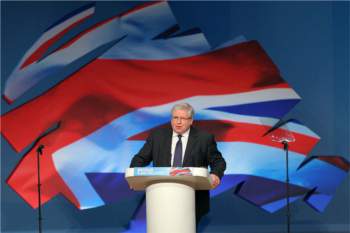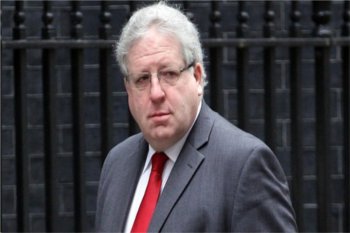Former transport secretary Patrick McLoughlin took over the Department for Transport (DfT) in the eye of austerity in 2012. He survived many difficult years and several major failures but leaves the department stronger than before.
By November 2012, the DfT was part of a group of core Whitehall departments – including the DCLG – where staff levels had fallen furthest and farthest since the 2010 Spending Review.

Mr McLoughlin addressing the Tory Party conference
The DfT has shrunk by around 22% in just two years and many in the department felt the change was ‘too deep, too fast’.
Mr McLoughlin arrived in September of 2012; in October the department suffered one of its worst failures in recent years in the West Coast Mainline debacle.
As a result of ‘significant technical flaws’ the competition to award the rail franchise was stopped by the transport secretary and the DfT estimates that the cost of refunding the bidders was between £40 -£45m.
Mr McLoughlin, on arriving at his new house to find part of the roof had just fallen in, reacted angrily but decently, stating that the fault lay ‘only and squarely within the Department for Transport’.
However, by 2014 problems persisted. That year the DfT drew up an improvement plan that stated there was ‘an urgent need for better capability, especially in commercial and project portfolio management skills’.
While in March last year the Commons Public Administration Select Committee said a repeat of the West Coast Mainline failure was ‘unavoidable’ unless civil service skills shortages were addressed.
This must be kept in mind when one considers the recent failures over the South East Flexible Ticketing scheme, which has spent tens of millions of pounds for little or no concrete gain, as revealed by Transport Network.
And again in the recent failures by Southern, under the Govia Thameslink (GTR) franchise, which led Claire Perry to say she was ‘ashamed’ to be a rail minister. Ms Perry resigned today.
Likewise, a £38bn upgrade programme for Network Rail came close to a juddering halt last summer, following a series of failures. Major upgrade works on the national rail network were suspended with ministers blaming Network Rail for mismanagement that had caused delays, missed targets and spiralling costs. A multi-billion pound fire sale and borrowing plans were drawn up to help cover extra costs.
The subsequent Shaw report laid the groundwork for a major overhaul of the operator and a regionalisation programme to devolve more control.
In rail, McLoughlin will be best remembered though as a safe pair of parliamentary hands for the HS2 project, which has passed all its major legislative hurdles under him in the face of fervent opposition and a series of judicial reviews.
All this is by way of an introduction to the considerable success, particularly in the local area, that the department has achieved. In highways, local transport and buses the department has made significant progress.
The funding settlement for local capital maintenance in highways from 2015-16 to 2020-21, brought a new sense of funding security to a sector badly in need of it. The Highways Maintenance Efficiency Programme and the self-assessment process have brought tangible improvements to a sector that had been somewhat neglected for many years.
Better asset management and respect for asset management could be one of his longest lasting and most unpublicised legacies.
With capital funding coming from DfT and revenue funding coming from DCLG, the capital and revenue funding divide - and the difficulties caused by the imbalance of falling revenues - was never abolished under Patrick McLoughlin.
However officials tried to make it clear to authorities they could be more flexible, even offering to come to an area and explain to whoever cared to listen just how flexible councils could be.
Funding for highways increased in capital terms for both local and the national network. With the creation of Highways England and a £15bn investment in the strategic road network operator, many complained that the 98% of the network made up of local roads was being short changed.
However Highways England have made a very positive start and gained knowledge that could yet benefit the sector as a whole.
The DfT has long since wished to ‘adopt a more intermodal strategy, taking into consideration issues of interdependency between transport modes’.

Mr McLoughlin has had some difficult walks into NO 10 over his time
With the total transport funding released by the department, which Patrick McLoughlin once said was one of his proudest achievements, a genuine start has been made in the local arena.
In fact, with local transport at the heart of many devolution deals, aided by subsequent legislation on regional transport bodies and the Bus Services Bill, the next secretary of state has an excellent foundation on which to oversee the creation of genuinely integrated regional networks.
The Bus Services Bill addresses, though perhaps not perfectly, the major problems of bus deregulation that began 30 years ago. For over a generation this policy has hamstrung many local nextworks, and has for some time been widely regarded as a failure. Only under Mr McLoughlin’s watch did some real progress get made.
However local accessibility is something the department has been far too slow and unsure about. The DfT has long pledged to review its Inclusive Mobility guidance and a spokesman told Transport Network a new accessibility action plan is scheduled for this year, setting out ‘what the scope of the review would entail’.
However the department has first been asked to do this under Mr McLoughlin back in 2013, with the transport committee having been assured it would be done. Key issues such as shared space have sprung up, causing great concern, with little direction or assurances coming from central government.
At the end of the last Parliament, Mr McLoughlin was hailed as a survivor by the transport select committee. Chair Louise Ellman pointed out to him that he had become the longest serving secretary of state for transport since Alistair Darling held the post from 2002-2006. Mr McLoughlin achieved nearly four years in a post that had become a revolving door, and achieved it at one of the hardest periods in its recent history.
Events have often threatened to overshadow his achievements, but Mr McLoughlin leaves behind a department that is in a stronger position than the one he found and a nation ready to enter into a new era of connectivity with grounds for real confidence.
Mr Mcloughlin has been appointed Tory Party chairman at a time of deep divisions in his party, but the 'survivor' will surely be ready to take on the task.
Register now for full access
Register just once to get unrestricted, real-time coverage of the issues and challenges facing UK transport and highways engineers.
Full website content includes the latest news, exclusive commentary from leading industry figures and detailed topical analysis of the highways, transportation, environment and place-shaping sectors.
Use the link below to register your details for full, free access.
Already a registered? Login